Why I Don’t Shut Up About ‘Harry Potter’
One little ill-informed comment in response to Jared Moore’s book, and I’m all over it. Why?
I believe that even six years after the final novel and two years after the final film, the Harry Potter controversy matters to Godly fiction fans. And this still matters to all Christians who want to discern based on God’s Word, not untruth and even possible mystical views.
Here are seven reasons why this topic still matters.
1. Many Christian critics don’t know what they’re talking about.
In this Amazon.co.uk “review” of The Harry Potter Bible Study1, the “reviewer” says:
It amazes me how stupid some so-called Christians are. How can films about the occult speak to us as believers. The author of this book needs to have a reality check when it comes to the Bible. This notion about studying the Bible through Harry Potter films as as [sic] justified as claiming that one could learn more about Christ by doing a Bible study on the scenes from The Exorcist. The evil one must love foolishness like this.2
All I can do is sigh, try not to be legalistic (in return?), and write something like:
So, you didn’t actually read the book then. 🙂 This is not much of a “review” then, is it mate?
My guess is that you haven’t read the “Potter” series either, or seen the films — or, as an absolute minimum related study requirement, seriously exegeted passages such as Deut. 18 and what occult notions they actually ban God’s people from believing or practicing, and His reasons why. I say this not to shame you, brother, but to challenge you.
No, if you haven’t read a book, that doesn’t mean you can’t discuss it or believe rightly about it. (I’ve discussed The Shack even though I’ve not made it through the first chapters — out of boredom.) But if anyone comes to you and claims, “Actually, you’re wrong about that book, and let me tell you why,” you only have two options: stop talking about the issue until such time as you’ve checked the claim, or check the claim.
That, er, reviewer clearly didn’t do his homework. Neither have many Christians. Christ is glorified and His people blessed when His people practice truthful discernment.
2. We must seriously exegete passages such as Deut. 18.
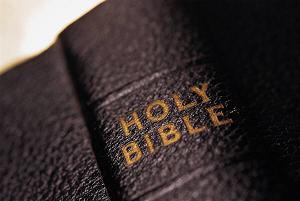 Our critic tossed out the “witchcraft isn’t Biblical” reason as if that’s it, argument made, close the book. In person, I’d prefer taking the time to build a relationship before giving a rebuttal (as opposed to writing that quick online comment). Either way, I would challenge the critic to read through all of Deut. 18, not just the occult-related verses in 9-14, then ask:
Our critic tossed out the “witchcraft isn’t Biblical” reason as if that’s it, argument made, close the book. In person, I’d prefer taking the time to build a relationship before giving a rebuttal (as opposed to writing that quick online comment). Either way, I would challenge the critic to read through all of Deut. 18, not just the occult-related verses in 9-14, then ask:
- What exactly does God forbid the Israelites from doing? Answer: Child sacrifice, and attempts to predict the future by omen interpretation or contacting the dead.
- What have these practices in common? Answer: trusting these instead of God as a means to manipulate one’s world and control one’s life. (This is the goal behind any real occult/witchery attempts, including the infamous “prosperity gospel” heresy.)
- Why exactly does God forbid these? Answer — found in the first and last parts of the chapter that form the context of the occult verses — because God alone was to be the Israelites’ only source of revelation. To communicate, He had appointed priests (verses 1-8) and even better, a final Prophet greater than Moses (verses 15-22).
- What should Christians take into consideration regarding the New Covenant, which must put some form of interpretive difference on how we read the Old Testament?
- Where exactly in the Harry Potter series is that kind of child sacrifice and divination exalted?3
3. Some don’t know the difference between “real” and made-up magic.
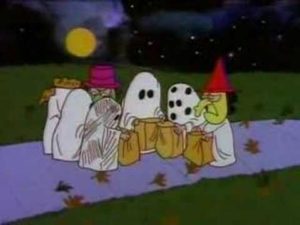 I first asked this in part 1 of the Harry Potter and the Issues Beyond Fiction blog series:
I first asked this in part 1 of the Harry Potter and the Issues Beyond Fiction blog series:
Do the following concepts fit inside the Biblical category of actual witchcraft? Or do they originate from popular culture, historic folklore, or perceptions of “magic”?
- Whimsical flying broomsticks.
- Cauldrons and potions with magical effects.
- “Wizards” who wear pointy hats and dress in long, shining robes.
- Disappearing from one place to appear almost instantly in another.
- Creatures such as werewolves, trolls, basilisks, centaurs, elves, goblins, and dragons.
With care, I would suggest that if you, even subtly, consider these things as exactly the same as Biblically defined practice of pagan occultism, you may have accidentally bought into some pop-culture notions yourself — and then read those back into the Bible.
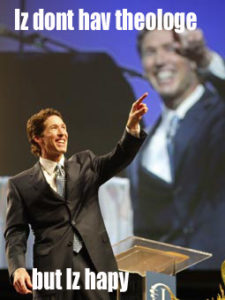
Real-life evangelical wizardry’s answer to Gilderoy Lockhart.
4. Christians target “Harry” while endorsing actual devilish evils.
I mentioned that we must “practice truthful discernment.” If we repeat lies about anything, even Harry Potter, we are repeating the work of the father of lies (John 8:44).
For too long the very name Harry Potter has carried a unique stigma. But what about Star Wars, Disney films, the aforementioned “prosperity gospel” preachers (whose spell-casting far out-darks Harry and friends), and moralistic Christian-esque children’s programs? All of these require discernment to sort light from dark, good and bad. Harry is not exceptional.
5. It’s a great conversation-starter.
One of the most-shared featured articles on Speculative Faith — by me, anyway — is Ten Wrong Ways To Discern a Story. Naturally Mr. Potter makes a cameo appearance, under the subhead “spreading lies about stories.” Pick any issue related to art and faith, storytelling and truth, and especially fantasy, and you can get there by talking about Harry Potter.
6. The series offers great stories that glorify God to discerning fans.
A spinoff conversation after The Magical Worlds of ‘Harry Potter’ and ‘Left Behind’ focused on whether Harry Potter had enough literary magic to join the ranks of Narnia or even Gandalf. In response to one reader who called Rowling’s novels comparative “junk,” I said:
Not junk. Certainly “Potter” isn’t junk. In fact, many rank Rowling’s story and plotting and mythological significance on equal terms with Lewis and Tolkien, and I believe this is fair. […] I love Lewis and Tolkien, but there are other gold-standard, did-what-they-set-out-to-do authors out there. Even Christian speculative ones. Surely Lewis and Tolkien themselves would encourage taking their work and then exploring further, including the literature worlds they wanted to tribute.
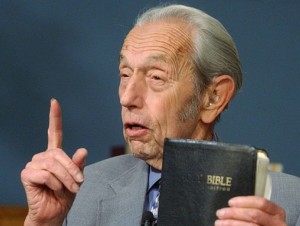
Numerology: a foolproof method of Biblical hermeneutics, according to this (now repentant) end-times teacher.
7. Because a six-item list would be bad; seven items is better.
Also, Harry Potter has seven books, which makes it spiritual. It is true because: numerology.
- Disclaimer: Of course Jared Moore is a friend, and we just finished our series about Teaching Story Transitions. Also of note: Moore’s perspective is not the usual “squeeze ‘Biblical’ principles out of the cool rock of pop culture” notions behind many “The X Bible Study” materials. ↩
- “Review” by “Predikuesi” (whose name ironically sounds like a Harry Potter charm), dated March 2, 2013 on Amazon.co.uk. ↩
- Slightly savvier Harry Potter critics will point to Harry’s divination class, introduced by that name in the third book/film, or the ghosts throughout the series to whom Harry and his friends talk. However, the ghosts are not contacted by occult procedures and never reveal the future, and Rowling nearly cheats us out of “divination” objections by keeping vague the source of the series’s central prophecy and also allowing characters to mock the supposed discipline of divination. ↩






































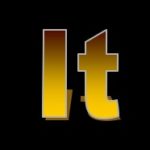



I’ve never read the books. They are too long and I am too lazy. Have seen the movies though.
I do have some issues and concerns with the series. But first, I find the notion of a Harry Potter Bible Study Guide pretty ridiculous, if I’m being honest. Um. If you want your kids to study the Bible, have them study the Bible. Once they’ve got that under their belts then let them decide if they think the Harry Potter series is God honoring or not.
I read a statistic awhile back, I don’t know where it was, or how accurate, so I suppose it’s moot, but it was some study about how the arrival of Harry Potter coincided with the rise of people identifying themselves as witches and warlocks as their religious persuasion. This is a risk the spec fic writer assumes. Or any writer for that matter. For every reader we point to truth, there may be another who falls further away based on our imaginings. I’m not saying we shouldn’t write because of this, but to deny it as a risk of the trade is irresponsible.
I’m a spec fic writer, so I’m not against speculation and exploration. What I am against is the spec fic writer turning a blind eye to truly damaging content. The argument of “It’s imaginary, so it’s okay.” doesn’t fly with me. Nor does, “It’s okay because Harry represents Christ at the end so it’s Christian.” Nope, not necessarily.
Some people think Harry is satanic/occultic. I’m okay with that. We need watchmen to keep us from straying too far afield. They may take it overboard sometimes, but I appreciate that some are willing fulfill that role despite all the heat they take for their unpopular opinions. Makes the rest of us think and forces us to be more discerning.
As did I, at first. We’ve all seen, say, The Beverly Hillbillies Bible study.
Moore’s book, however, is not like that. It’s not chance moralism echoes in fiction, but Gospel-echoes, that the book explores. It is, however, mostly an introduction to the practice of enjoying a certain story for the glory of God.
Definitely agreed here. I can confirm the book endorses this. In fact, it’s not so much a “Bible study” at all as a “Harry Potter” study, informed by the Bible. (Other nonsense, such as that classic The Beverly Hillbillies Bible Study, does indeed study the Bible “through” whatever Hillbillies episodes happen to have fallen into the public domain, save of course for the theme song.)
I’ve often heard of this. It’s rarely sourced, but I like to assume it’s true only for the sake of rhetoric. And I say: so what? Most people in America abuse the Bible for their own sins (quoting “judge not” to endorse secular tolerance, etc.). That does not mean the Bible causes sin — only that humans will abuse anything for sin.
Yes. And the risk I assume as a Harry Potter fan who recommends the series. I would not discuss it with anyone I don’t know, or on the internet, without bringing up the stigmas and “stumbling blocks” and doing my best to address them.
Neither does it with me. In fact, it’s very close to the “it’s just entertainment” “justification.” That I rebuke with: Don’t insult a story like that. A good story is never “just entertainment.” All things must be discerned.
Yes. And that was one reason why Christians finally quit picking on “Harry Potter” and chose to recommend it (to the irritation of persistent critics who now ignorantly ask “why did you all suddenly COMPROMISE WITH EVIL???!!!1!”). But it need not have been the only reason. It’s simply good storytelling. And when not even the parables of Christ had a “Christ-figure,” we need not insist on one in every story.
More on this topic: Going Beyond ‘Yay! It’s a Christ-Figure’
I disagree with this, for the very reasons that I outlined above. Satan’s real work is not nearly so “overt” as they seem to claim. And neither is actual evil occult practice equivalent with what is, by and large, folklore-derived “magic.” Our discernment must be based on what God actually says is wrong, not folklore.
On this I think I can agree. After all, had the wrong sorts of “discernment” folks not been doing this, others would not be motivated to apply equal discernment not only to the stigmatized Thing, but to the “discernment” methods themselves. It’s wrong to excuse any story because it’s “just entertainment” or “just imagination.” But it’s equally wrong to spread our own myths about what the Bible says is wrong, or about stories, because we only want to avoid the error of not discerning at all. Bad discernment is just as un-Godly as no discernment.
I don’t bring it up to imply, “It’s absurd to discern Biblically something so obviously ‘entertainment’ and unspiritual! We only need to study the Bible!” That’s the connotation I’ve heard from other Christian teachers and pundits who bring up this particular product. Instead I rebut this with, “Why do you need to have a published Bible study to discern a particular series (even if it does conveniently have episodes in the public domain)? Instead this discernment should come more naturally to Christians, even informally. You don’t need to have a church ‘Bible study’ proper about it. Spread this Biblical discernment to every area of life.”
You’re not listing all the prohibitions in the Deuteronomy passage. One of which is “one who casts a spell,” the literal Hebrew, as translated by OT Professor Raymond Dillard of Westminster Theological Seminary. If that doesn’t fit our boy wizard in the pointy hat, I don’t know what does.
A challenger appears! Thanks for your iron to help sharpen my own, HG Ferguson.
Some quick replies (with some editing later):
1. Verse? Linkage to the alternate translation?
Either way, I am still finding the common element in all God’s commandments: don’t be like the pagans around you who practice “magic” in attempts to control life or predict the future. I am the LORD; I do not communicate with you that way, and here is how I do.
2. What’s the definition of “cast a spell” for them, the Israelites, and best application to us today?
I’m not advocating trying to cast any spells, based in actual occult or fiction.
God defines a class of “the abominable practices of those nations” (verse 9). If one could prove that the Israelites would indeed have been tempted by Edomite sorcerers to attempt transfigurations into cats, or to brew love potions, then one might have a case that the series does describe literal, functional, workable “spells” that are the same as God forbids.
3. But I’m afraid that even then I would jump to the Daniel argument.
In Daniel 1 we read that this expatriate God-fearing chosen one studied actual pagan myth and surely “real” witchcraft at the “Hogwart’s” of his time, the secular school of Babylon. Yet he did this without sin, and with the help of God. This does not prove that every one of God’s chosen ones will have this abilities. But I don’t need to prove that — I only need to show that some Christians are indeed so gifted with skill and discernment to study evil materials and shun the temptations associated with them.
About the Daniel argument … I’m looking at my New King James version, and I don’t really see what you mean by studying witchcraft. The only verses I see that could be interpreted as such are 1:4, “…and whom they might teach the language and literature of the Chaldeans”, 1:17, “…and Daniel had understanding in all visions and dreams”, and 1:20, “And in all matters of wisdom and understanding about which the king examined them, he found them ten times better than all the magicians and astrologers who were in all his realm.” While I do see them studying pagan beliefs, nowhere do I see them actually practicing them. Before you say anything about the visions and dreams, Joseph had a similar ability with no study of Egyptian beliefs, those gifts come from God. Am I missing something?
Specifically I’m referring to 1:17, yes, but when it says “God gave them learning and skill in all literature and wisdom” (ESV; the NKJV says “God gave them knowledge and skill in all literature and wisdom”). It specifically says literature. They weren’t studying Dickens in ancient Babylon.
And clearly at least some of God’s people were able to study actual occult training manuals and could memorize the material, yet not practice it.
To me, this is the final “level” of counterargument against “Potter” critics. My first, though, is to challenge whether anything called “magic” or even “wizardry” in a work of fiction is identical to the sin of sorcery practice that God condemns.
Neither do I. And I certainly don’t here advocate practicing actual paganism.
Yet it’s intriguing to note that God dared to give His servants skills with dreams and visions that could have been, by the Babylonian pagans, misinterpreted as similar to their own soothsaying. Of course we learn later that Daniel’s real gift pwned the pagans’ fakeries. But the point is that God doesn’t seem as fearful about having His people and their gifts confused with paganism as we may be.
I’ll work with the idea that Daniel may have read detailed descriptions of occult practices, rather than legends and mythologies. I still feel that there is a difference between reading a neutral manual and reading a story in which the hero uses these or similar manuals to do similar things. For instance, reading about how to do an abortion is different from reading a story in which the hero conducts an abortion and is applauded for it.
Your argument that Harry may use a different sort of magic than what is forbidden in the Bible seems a bit stronger to me, although there are other reasons that people dislike the series. Personally, I don’t feel a need to read the series or to try to convince others to not read it, I only got involved because your comment about Daniel using magic confused me.
I’m certain he read detailed descriptions (functional and otherwise) and legends and mythologies, the Marduk myths and everything else — either way, the Babylonian equivalent of what folks claim “Harry Potter” is now.
Indeed. And yet I want to clarify that this is a second-tier defense of the “Harry Potter” series. It may be more necessary to defend Christian exposure to other works. But the “Potter” series does not need this argument; I only raise it as a future prevention and a broader challenge. 🙂
Once again I say: There are no actual occult prescriptions in the “Potter” series. And I’d go so far as to say that Christians who believe the “Harry Potter” series promotes actual, functional, working spells and “magic” are themselves buying more deeply into paganism and mysticism than they would dare to consider.
Make no mistake: Christians are vulnerable to real-world occult and magical views. This creeps into our prosperity gospels, our political gospels, and our “save the family and you save the world” gospels. And it’s even more overt when Christians get into Weird Stuff. Recently I saw this with someone who was promoting some YouTube movie purporting to prove the Biblical account of “Nephilim” (Gen. 6) using Fringe Archaeology (similar to crystal skulls and the like — “Coast to Coast AM”-type material.)
However, “Sons of God” in Gen. 6, who married women and had children, does not automatically mean “fallen angels raped woman and had demon/human spawn children.” This is mysticism, mythology, extra-Biblical speculation. Fun stuff. And I enjoy fantasies such as “The Cradleland Chronicles” by Douglas Hirt that explore this possibility. But it has little place in serious Biblical exegesis, and even less in apologetics (read: no place).
Frankly I consider Christian confusion and obsession with “Nephilim” as possible evidence of demonic deception in a completely unexpected way. If demons are behind this notion, well, it both distracts from the human evil in Gen. 6 and exaggerates demons’ powers. “Oh yes!” the demons would be so glad to affirm, so long as it distracts from humans’ knowledge of their own sin. “We made you do it back then! And all you need to worry about is demons today, not the conditions of your own heart.” As for my claim of exaggerations, all these demon/human love affair mythologies are surely nothing more than demons’ locker-room boasting. “Ha haaa,” they may be cackling there in the Lowerarchy’s locker rooms, presumably while snapping junior tempters with sulfuric towels. “I totally got laid before the Flood.”
“Ha haaa,” they may be cackling there in the Lowerarchy’s locker rooms, presumably while snapping junior tempters with sulfuric towels. “I totally got laid before the Flood.”
o-@
Oh. Wow. Um. Yeah … Ow. My poor, poor mind …
You’re welcome.
When I read the book as a child, a classmate told me (probably having got in from his mum) that when Jesus returns, my hand will be burnt if I’m reading the book when he does. I love the books, they are full of imagination and I don’t think God is angry with me for reading them. I feel that there’s a lot worse books out there I could be reading full of sex and violence.
Anonymous, that’s just the kind of nonsense that confirms my suspicion: that Christians who condemn “Harry Potter” and/or believe other things are practicing far more of the “magic” and mystical thinking than man of those casual “Harry Potter” fans. I now begin to wonder if this is just plain psychological projection, e.g., “I think magically/superstitiously about Things, so you must too.”
Or it could just be the parent deliberately lying to her child to make him behave as she wants him to (which is also wrong).
‘After all, had the wrong sorts of “discernment” folks not been doing this,’
Who do you consider the “wrong” sorts of discernment folks? (Notice how I flipped the quotation marks there…)
Have you read this gentleman’s essays about Harry Potter? I read them in the past and felt they were thoughtful and nuanced. Not knee-jerk at all.
http://www.studiobrien.com/category/writings/writings-on-fantasy/
On wrong discernment: folks who either mean to be Biblical and simply hear incorrect facts (and believe or repeat these), or folks who claim to be Biblical but end up being careless about what the Bible or other discerned Things actually say.
I’d not read O’Brien’s critiques, but beginning to read now, I do find them more nuanced and careful. However, he seems ultimately to come down on the same myth-conceptions of the more-reactionary critiques: that Things can be blamed primarily for people’s sins, that discerning readers are somehow held hostage to the sins or (at best) weakness of other readers, that literary or folklore “magic” is identical to the kinds of occult practice God actually forbids, and that enjoying even a story in which these practices do appear inevitably leads to sin.
I think his gist is more that he thinks Rowlings has created a deformed moral order, which requires at the end for evil to be defeated by evil. I’d have to watch the ending again, but something about how the wand which is evil in Voldemort’s hands turns good in Harry’s hands. I dunno, he explains it way better than I do. O’Brien isn’t against magic, because he speaks highly of Tolkien and Lewis. I think he wrote a comparison of Harry and Frodo, if I’m remembering correctly. And he refers to Tolkien:
“As Tolkien once pointed out in his essay on fantasy literature, the writer who hopes to feed the imagination in a healthy way must remain faithful to the moral order of the real universe, regardless of how fantastic the details of the fictional world may be. The Natural Law which God has written into our beings cannot be entirely eradicated, but it can be gravely deformed, leading to distortion of consciousness and conscience, and hence our actions.” http://www.studiobrien.com/harry-potter-and-the-death-of-god/
I’ve not read the book so I can’t comment specifically – but that could mean the wand is simply a neutral tool, which can be used for good or evil.
Or, of course, it could remind us (deliberately or otherwise) of the cross – an evil tool made for evil purposes – and used by God for good.
Lines such as this are what concern me:
This is a wrongful generalization of all “Potter” fans. First, it assumes that all fans approach the series for the same purpose. Many readers are not after pseudo-transcendence; they’re after real transcendence Himself, and the series overall reminds them of Him in its creativity and mythical hero’s journey. Second, it confuses cause/effect. I suggest the Biblical Christian believes in the cause, that man is sinful, and the effect, that man uses Things for sinful purposes.
(Slight complication: the things can in turn draw out the sin in man, meaning even struggling Christians must give up some things that draw out their sin. But this is not a reflection of a Thing or its maker as much as it is on the abusers.)
O’Brien is Catholic so I disagree with him on some very fundamental issues regarding the faith, but I do find his arguments compelling to the point that I don’t feel comfortable promoting the series in a gung ho sort of fashion.
Also, the final movie left me feeling a bit depressed and disjointed. That could be because I felt sadness that the series was over, or maybe I ate too many onions before the movie. Or maybe the story left me dissatisfied on some deeper spiritual level. (I didn’t get that feeling after the Lord of the Rings movie series. I felt sadness that Frodo couldn’t slough off the effects of his intimate confrontations with evil, but I understood why he could not because it resonates with my own experience.)
I do tend to be emotionally sensitive, so while I don’t base my arguments on my emotional response (or try not to), I do respect the emotional response enough to distance myself from the trigger until the reason for the response is more clearly revealed to me. It may take years for the revelation, or a revelation may never come. No matter. There are plenty of other stories out there to enjoy in the meantime.
First, read the books. The story becomes so deep and complicated that the movies just fail. I saw the movies first, and the last ones so confused me that I finally gave in and read the books.
Second, the Elder wand is just a wand. It’s not good. It’s not evil. It’s just a powerful tool that has been used by evil men to do evil things.
Third, Voldemort kills Voldemort. I think the movie totally ignores this part, but in the last moment, Voldemort sends a killing curse at Harry, and Harry sends a disarming hex back. The two collide in the middle, and Voldemort’s curse rebounds and kills him, as the Elder wand, per Harry’s disarming hex, flies from his hand.
Finally, evil doesn’t conquer evil. In fact, good doesn’t win out just because it’s good. In the end it takes a death – a life willingly given, defeats evil. Actually three deaths – a mother who gave her life to save her son, a man who’s soul was torn apart by bitterness and regret, but who would not desert his duty and allow Voldemort to kill another in his place, and finally, a son who gave his life to save his friends.
“The last enemy that shall be destroyed is death.”
It’s written on the gravestone of James and Lilly Potter, and is the key to the whole series – pity Hollywood missed it entirely in the movies.
Oddly enough, I’m not even a “Harry Potter” fanboy. I didn’t grow up on this series as I did with Narnia and even Middle-earth. But I do see that it’s not only under-valued by some Christians, but used as a unique example of supposed worldly perversion. And I’m eager to challenge that.
I also felt a bit down after the film series was over. However, it likely helped that I had known the exact ending — more or less, per the adaptation — from the books. The books naturally give a more-robust exploration of that world.
On the idea that Harry Potter influenced kids toward paganism or occult practices, there is not any evidence. The story is false, originating from the Onion as a satirical piece.
Snopes details the whole thing:
http://www.snopes.com/humor/iftrue/potter.asp
Here is the original Onion article, still up after all these years (published in 2000):
http://www.theonion.com/articles/harry-potter-books-spark-rise-in-satanism-among-ch,2413/
My first book was published in Nov 2007, “Infinite Realities.” It was on the heals of the last HP book being published, and all the uproar about how bad HP was had boiled up…again. So I felt it necessary, since my world was a bit magical, to put an article at the back of the book titled, “Why I as a Christian Author, Write Fantasy.” I believe it is still on the web.
http://residentialaliens.blogspot.com/2008/12/fantasy-and-christianity.html
Good point, Stephen. I appreciate your contribution to the discussion.
I’ve argued before that a big problem with the reviewer’s line of thought is that it’s impossible to define “the occult” in any real terms. It becomes this nebulous thing that can ensnare you if you read the wrong book or listen to the wrong song despite there not being anything for the person to practice. I think you have far more risk reading a book by Ayn Rand than Harry Potter, because the former teaches a philosophy one can practice and that appeals to the darker urges far more effectively than any fantasy could.
Yes. And yet many Christians buy right into that kind of Godless “conservatism,” even while they decry only easy targets like fantasy novels as actually sinful.